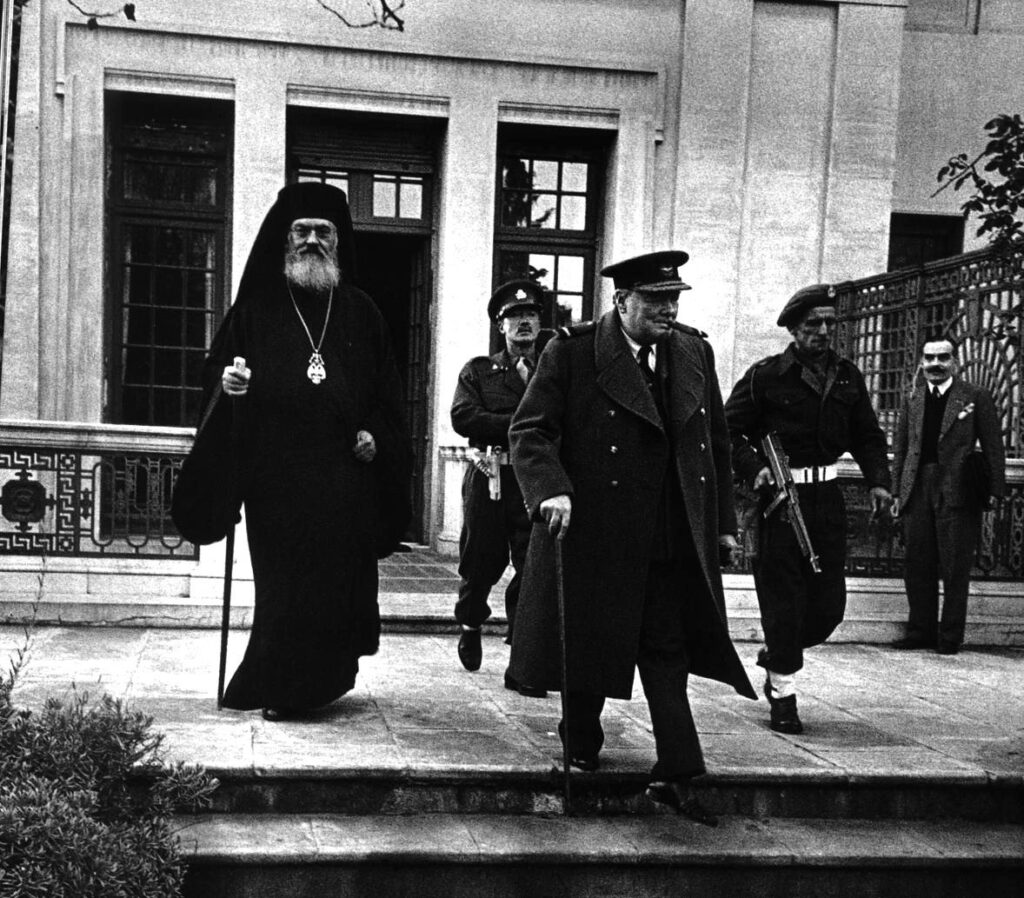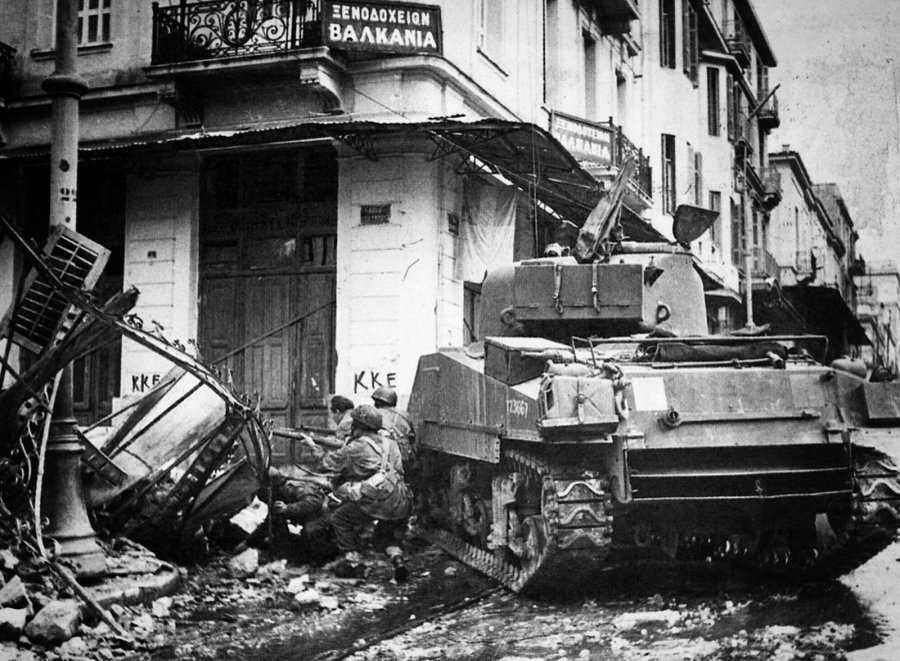By Katerina Papadea,
Dekemvriana (December events) is the name that was given to the armed conflict that took place in Athens between the National Liberation Front and its military wing, the Greek People’s Liberation Army (EAM/ΕΛΑΣ), on one hand, and the government and British forces on the other, under Papandreou’s government. The official date for the start of this civil conflict is December 3rd, 1944, which was marked by the bloody end of the rally in Syntagma Square, although in fact, the tensions had already peaked on December 1st. This civil conflict formally ended on February 12th, 1945, while the prevailing view is that this internal conflict, aided by the external factor —Britain—, promoted the country in the civil war of 1946-1949, verifying the endemic disease of the Greek state, the national division.
The reason for this controversy could reasonably be considered the power vacuum in Greece, after the withdrawal of the German occupation forces in October 1944. Until October 18th, when George Papandreou and the government of National Unity arrived in Athens, a share of power —if not all— was claimed by the National Liberation Front/Greek People’s Liberation Army, which had a well-organized military corp. The Papandreou government was accompanied by exiled Greek armed forces and a small British expeditionary force under General Scobby. Papandreou, therefore, with the support of the British and the approval of the British ambassador, submitted to the cabinet a bill, according to which all the armed forces of the resistance organizations, left and right, should be disbanded before December 10th, so that to create a National Guard, which will be the “embryo” of the future Greek Army and will consist of an equal number of right and left soldiers. This National Guard would automatically include the 3rd Mountain Bridge and the Holy Corps, as an already existing and ready army, which was not logical, as Greek People’s Liberation Army was already a ready and tested army. Thus, on November 30th, the Communist Party of Greece and the National Liberation Front proposed, reasonably and fairly, to disband Greek People’s Liberation Army at the same time as the 3rd Mountain Brigade, and to form an army from the beginning, with mobilization, a request that was finally rejected by G. Papandreou.

This, combined with the release of leaflets by Scobby, ordering National Liberation Front’s guerillas to surrender their weapons by December 10th without the Government’s knowledge, led to the resignation of the 6 National Liberation Front’s ministers, who participated in the government, and strong protests.
On December 1st, 1944, Scobby, in the absence of the Greek Government, called on Greek People’s Liberation Army to surrender its weapons and on December 2nd, he filled out leaflets in Athens, promoting National Liberation Front’s response, calling for a general strike, on Monday, December 4th, and in a popular protest rally against the British on Sunday, December 3rd, despite the Government’s ban. The rally was stained with blood, as protesters were fired upon by security forces, killing 30 people and injuring 148. The funeral of the victims of December 3rd took place on Monday, December 4th, while Papandreou, seeing the conflicts generalize, submitted his resignation, arguing his inability to tolerate the massacre among Greeks. However, he revoked his resignation after Sophoulis refused to scold him and the British intervention to persuade him to stay in his place. On the same day, Scobby declared martial law and called Greek People’s Liberation Army to evacuate Athens in one day, which did not happen, and Greek People’s Liberation Army began occupying police stations and disarming police officers, who eventually sought the protection of the British. The oxymoron, in this case, is that, on one hand, G. Papandreou opposes bloodshed, on the other hand, he approves of the armed intervention of the British, whose dispositions arise from Churchill’s orders to Scobby, as mentioned in the telegram sent to him. The British Prime Minister, Churchill, characteristically states: “Do not hesitate to shoot any gunman who dares to challenge the English prestige in Athens or the Greek prestige on whose behalf we act. You are responsible for maintaining order in Athens and you must neutralize all groups National Liberation Front- Greek People’s Liberation Army that will approach the city”. Also, Churchill took full advantage of the neutrality of the Russians and the Americans and seemed to disregard international public opinion, because he knew that in war, the law was not moral, but violent.

From mid-December, government forces gradually began to gain ground. The British with select soldiers, tanks, and Air Force, after first neutralizing the force of Greek People’s Liberation Army in the eastern districts of Athens and especially in its stronghold, Kaisariani, began to clear the city center, where Homeric Street battles were fought in the alleys Omonia, in Psyrri, and Metaxourgio. Churchill believed that the Greek problem could not be solved by military means, but only by political means; which is why, on Christmas Day, he came to Athens. In successive meetings at the Ministry of Foreign Affairs, it was decided to ask the exiled King George II to appoint a Viceroy — specifically the Archbishop of Athens, Damaskinos.
On December 30th, the King succumbed to the unbearable pressure of the British and announced the appointment of Damascene as regent and his intention to return to Greece, only if the people wanted it. George Papandreou resigned as Prime Minister and, on January 3rd, 1945, he was succeeded by Nikolaos Plastiras. On January 5th, 1945, the Greek People’s Liberation Army forces were forced to leave Athens under pressure from superior government and British forces. On January 11th, ΕΛΑΣ signed a truce with the British, and on February 12th, 1945, Dekemvriana had formally ended with the Varkiza Agreement. The National Liberation Front had been defeated both militarily and politically.
References
- Ραφαηλίδης Βασίλης, Ιστορία (κωμικοτραγική) του νεοελληνικού κράτους 1830-1974, εκδόσεις του Εικοστού Πρώτου, Αθήνα, 2018
- Thomas W. Gallant, Νεότερη Ελλάδα: Aπό τον πόλεμο της ανεξαρτησίας μέχρι τις μέρες μας, εκδόσεις Πεδίο, 2017




